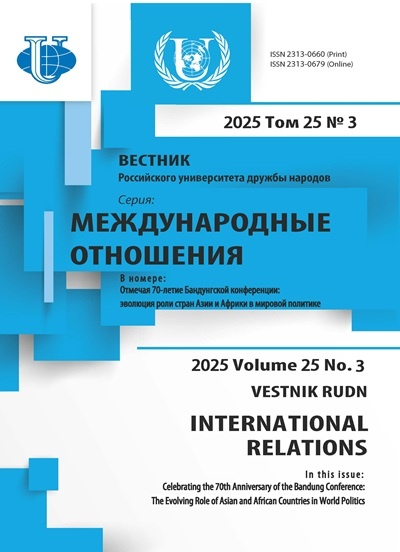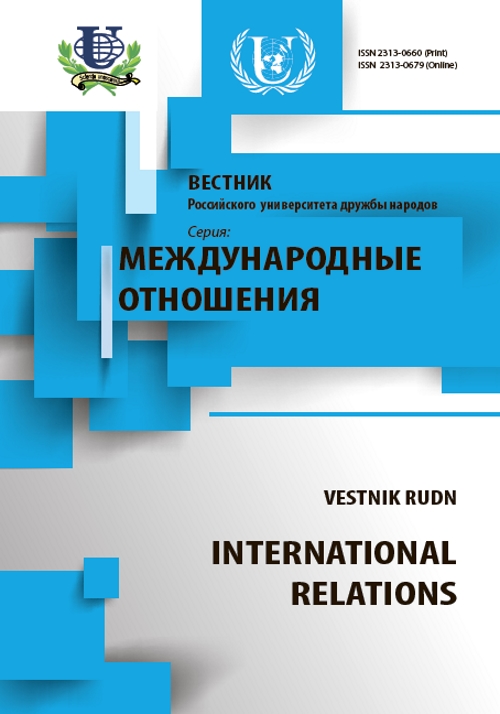Эволюция корейской политики офицальной помощи в целях развития
- Авторы: Лим Ю.М.1
-
Учреждения:
- Женский университет Ихва
- Выпуск: № 1 (2015): Восточная Азия: возвышение КНР, сотрудничество в целях развития, партнерство с РФ
- Страницы: 15-23
- Раздел: СТАТЬИ
- URL: https://journals.rudn.ru/international-relations/article/view/10365
- ID: 10365
Цитировать
Полный текст
Аннотация
С момента вступления в Комитет содействия развитию (КСР) ОЭСР в 2010 г. Республика Корея предприняла немало усилий, чтобы повысить свою роль в области международного сотрудничества в целях развития. В статье анализируется эволюция корейской политики официальной помощи в целях развития (ОПР), рассматривается, каким образом опыт Кореи в области содействия развитию в качестве рецепиента помощи и ее присоединение к КСР формировали политику и стратегии ОПР. Различные интересы и мотивации Министерства стратегии и финансов и Министерства иностранных дел и торговли сильно влияют на корейскую политику ОПР. Корейское правительство взяло на себя обязательство «наводить мосты» между развитыми и развивающимися странами, предложив «корейскую модель ОПР». Тем не менее интеграция принципов и норм КСР в корейскую модель ОПР остается вызовом.
Об авторах
Юн Ми Лим
Женский университет Ихва
Email: emlim@ewha.ac.kr
Высшая школа международных исследований
Список литературы
- Allesina, Alberto and David Dollar Who gives foreign to whom and Why? // Journal of Economic Growth. (March). 2000, pp. 33-63.
- Chun, Hong-Min, Heejin Lee, and Elijah N. Munyi South Korea as an Emerging Donor: Challenges and Changes on Its Entering OECD/DAC // Journal of International Development, 2010, 22, 6.
- Exim Bank of Korea Republic of Korea’s ODA Statistics and Reports (in Korean), 2013.
- Hattori, Tomohisa The moral politics of foreign aid // Review of International Studies. 2003, 29, pp. 229-247.
- Jeong, U-jin Successful Asian recipient countries: Case studies of Korea and Vietnam // International Development Cooperation, KOICA (March), 2010.
- Jeong Yu-Ah. Korea Development Policy Focus (in Korean). Korea International Cooperation Agency, 2010.
- Kim E.M. and Oh J.W. Determinants of foreign aid: the case of South Korea // Journal of East Asian Studies. 2012, 12, pp. 251-273.
- Kim, Soyeun Bridging Troubled Worlds? An Analysis of the Ethical Case for South Korean Aid // Journal of International Development, 2011, 23, pp. 802-822.
- KOICA. Aid Statistics (in Korean). Seoul: KOICA, 2008, 2009, 2010.
- History of KOICA’s Priority Recipient Countries (in Korean). Seoul: KOICA, 2011.
- Koo, Jeong Woo, and Daewook Kim World Society and Foreign Aid: Explaining Determinants of Korean ODA, 1989-2007 // Korean Journal of Sociology (in Korean) 2011, 45, 1: 153-190.
- Lancaster, Carol Foreign Aid: Diplomacy, Development, Domestic Politics. The University of Chicago Press, 2007.
- Lee, Jae Woo Effectiveness of Grants and Concessional Loans on Korean economic Development Process. (in Korean). Korea Eximbank Overseas Economic Research, September, 2006.
- Lee, Kye-woo, and Gi-hoon Park. An Evaluation of Korea’s 20-Year ODA // Korean Development Review 2007, 29, 2. (Reprinted in Korea Focus, 2008).
- Lee, Kye-woo Do emerging Donors Allocate Aid as DAC members Do? The Case of Korea in the Millennium Era // Journal of International Development, 2012.
- Lebovic, James H. Donor Positioning: Development Assistance from the U.S., Japan, France, Germany, and Britain // Political Research Quarterly, 2005, Vol. 58, No. 1 (March), pp. 119-126.
- Mason, Edward S. et al. 1990. The Economic and social modernization of the Republic of Korea. Harvard East Asian Monographs. Harvard University Press.
- Ministry of Foreign Affairs. 2014. Summary of OECD Report (Released on April 9).
- Neumayer, Eric Is Respect for Human Rights Rewarded? An Analysis of Total Bilateral and Multilateral Aid Flows // Human Rights Quarterly. 2003, Vol. 25, No. 2 (May), pp. 510-527.
- OECD DAC. 2012. DAC Peer Review of Korea 2012. Paris: OECD.
- Prime Minister’s Office. Korea ODA White Paper (in Korean). Republic of Korea, 2014.
- Opening a New Era for Happiness for All Humanity. Republic of Korea, 2014.
- Riddle Roger C. Does Foreign Aid Really Work? Oxford University Press, 2007.
- Sohn H.S., Ahn A.J. and Hong J.Y. What matters in determining Korean ODA allocation: An empirical analysis of bilateral aid since 1991 // Korean Political Science Review. 2012, Vol. 45, No. 6.
- Steinburg David. Foreign Aid and the Development of the Republic of Korea: the Effectiveness of Concessional Assistance // Aid Evaluation Special Study, 1985, No. 42, Agency for International Development, Washington: U.S.
- UNRISD Economic and Social Development in the Republic of Korea: Processes, Institutions, and Actors // Research and Policy Brief 14, 2012.
- You, Woong-Jo An Empirical Study on Korean ODA Policy // World Regional Studies Review (in Korean), 2009, 29, 1: 34-58.
- EDCF ODA Statistics. Available at: http://www.koreaexim.go.kr/kr/index.jsp#afrm_3.
- Prime Minister’s Office. Korea’s ODA Statistics Available at: www.odakorea.go.kr.
- OECD DAC Aid Statistics. Available at: http://www.oecd.org/dac/stats/final2013oda.htm.
Дополнительные файлы










